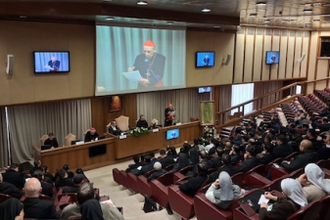Sunday Reflection with Canon Robin Gibbons: 23 February 2025

Ravensburger Madonna
Seventh Sunday of Ordinary Time
In an age that has perhaps so much (too much?) information freely available and where people feel able to critique, comment and express their opinions openly, it is wise for the Christian to learn the art of discernment as part of the ancient spiritual teaching on forgiveness and all that this implies. We start, as always with the Lord's words, which we find in the gospel of Luke this Sunday; "to you who hear I say, love your enemies, do good to those who hate you, bless those who curse you, pray for those who mistreat you". (Lk 6:27,28) This is a difficult saying and it is certainly not easy to put into practice, but we can and should try because it is part and parcel of the great commandment of love. If we are serious about being follower of Jesus, then the inner life, our spiritual life is as important to us as is the outer life, both are connected and both need nourishment and care. How then are we to start doing these four actions; namely to love, to do good, to bless and to pray for all those who are difficult with us?
The first step is to root ourselves in God.
The opening verses of psalm 102, which form part of the responsorial psalm, gives us the ready made starting point of our journey into discernment of forgiveness. Quite simply it is a method known to all who embark on that wonderful inner journey of seeking God, if we take the psalm's words as our starting point, this is what we find:
"Bless the LORD, O my soul;
and all my being, bless his holy name.
Bless the LORD, O my soul,
and forget not all his benefits".(Ps 102:1-2)
You may wonder what this might mean in the context of these hard sayings of Jesus, but it isn't difficult to make the connection with the great commandment, for it is in essence simply this: "You shall love the Lord your God with all your heart, and with all your soul, and with all your mind".(Lk 10:27) To bless the Lord is to remain fixed in God's presence, giving all our attention to that act of communication with the One beyond all things. To bless the Lord, is to open up our heart, soul and mind to Christ. To bless the Lord is the daily practice of praising and blessing his name, which places us immediately, whether we realise it or not, of being in the presence of God, and therefore accessible to being formed and changed through the Spirit. This is ancient and deep Christian teaching of rooting ourselves in God. The desert father Abba Macarius teaches us this simple way to start: "When you pray, do not think of many things, but simply say, 'Lord, have mercy'". We are reaching into that call of Jesus to be mindful of what is really necessary in our lives, and it is to make real in our spiritual life, that first commandment of love for God.
Knowing God's mercy
Those words 'kyrie eleison' are more than a simple invocation to Christ for forgiveness, the mercy of God is unlike ours, it has no boundaries, and as the word eleison implies in its roots: mercy is pressed out from the Holy One, just as the olives are pressed, until the last drop of oil is found; only in Christ there is no end of this flowing mercy. So by attuning ourselves to this manner of being in the presence of God, and by simple prayer, we begin to discern a way, namely the route of abandoning ourselves into the hands of the Lord in trust. To bless, to praise, to call on the name of the Lord Jesus, or the Holy Trinity, One God, is no idle act, it is a deep call from the soul, of the need to belong, it is like a child crying for its mother, or a lost sheep bleating, seeking the presence of safety in the shepherd of souls. We are more than reassured, we are assured, that the Lord hears us. For we belong to the Lord and He knows us before we understand ourselves. This is where our spiritual path needs to go, deeper into those unknown places of the heart.
A second step into change of manners
To embark on the journey with Christ into forgiveness requires discernment at all stages of the journey. Jesus is not a hard teacher, in our gospel today he gives us practical ways of building up our own tolerance of love, not the way we want or think we should love, but of divine love, in order that we might start to share in the quality of mercy. We are called to become part of that phrase Kyrie eleison, because for His sake we press out from the hidden depths of our mind, heart and soul, a forgiveness for others that is not entirely human in origin. This is how saints are made, they become open to the new ways God causes us to discover in life, but there is no compulsion, the choice is always ours, only the saints choose God! Part of this second step into change is to manage our expectations of Christ! Do not make of Him what he is not, that is a projection of ourselves, He is no projection but a real and intimate part of our hearts and souls and once we cease to fear Him but love him gently, then that gift of the Spirit will come into play in ways we cannot yet imagine.
We will return to this theme in a later reflection, but for this week's insight we must look at the practical ways Jesus helps us to move away from our anger and hate towards others. Again, like that first step, this second one is a call to change our manners, our way of living. It might not seem much, but like a candle flame it will begin to light up the darkness of our world. To help us begin, Jesus gives us examples of what it means to forgive, far from being passive, they are dynamic in their challenge to evil, and his own base line is this, "do to others as you would have them do to you" (Lk . 6:31)
Do not judge
But 'doing' to others needs discernment, for it may also mean at times 'not' doing something, such as refraining from letting our anger rip, holding back. But it is not about letting wicked evil people walk all over others, it is about the activity of love which will challenge others in their being, it is about knowing what is going on but tackling it from another angle, not judging others from our own perspective - but through the lens that is the mercy of God. It is simply about the outpouring of redemptive love, to help us become like Christ. May we open ourselves to Christ and journey with Him, that we too may change our world.
"Stop judging and you will not be judged.
Stop condemning and you will not be condemned.
Forgive and you will be forgiven.
Give, and gifts will be given to you;
a good measure, packed together, shaken down, and overflowing,
will be poured into your lap.
For the measure with which you measure
will in return be measured out to you." (Lk 6 : 37,38)
Lectio
From a homily of Pope Francis
Casa Sancta Marta
10. 09. 2015
So, there are two key words. The first is forgiveness: if we do not learn to forgive one another, we will always be at war. As the Lord has forgiven you, so should you do. But if you do not know how to forgive, you are not a Christian, because you do not do as the Lord did. Moreover, if you don't forgive, you cannot receive the Lord's peace, the Lord's forgiveness.
Each day, when we pray the Our Father, we say: 'forgive us, as we forgive'. And this, is in the 'conditional': we are trying to convince God to be good, as we are good in forgiving: in reverse. Words, no? Like she sings in that beautiful song: 'Words, words, words', no? I think the singer is Mina.... Words!.
This is the right path: Forgive one another! As the Lord has forgiven you, so should you do! Forgive one another! And some good advice for forgiving each other: forbear one another at home, in your neighbourhood, at work.... Bear with each other, without resorting to whispering: "He did that...". It's important to forbear, because he too bears with me". In short, it takes Christian patience.
How many heroic women there are among our people who, for the good of their family, of their children, forbear so much brutality, so much injustice: they forbear and go forward with their family. And how many heroic men there are among our Christian people who forbear getting up early in the morning and going to work - often unfair, poorly paid work - to return late in the evening, in order to provide for their wife and children. These people are the just ones.
However, how many others there are who, instead of doing what they should, wag their tongue and create conflict. Indeed, the same damage that a bomb creates in a town, the tongue creates in a family, in a neighbourhood, in a workplace. Because the tongue destroys, it creates war. And I'm not saying this, the Apostle James says it. Here then is the practical advice of St Paul: "As the Lord has forgiven you, so should you do: forbear one another and forgive one another".
Then, there is another word that Jesus says in the Gospel, because it repeats the same topic: mercy. In the passage of Luke 6:27-38, the Lord says: "Be merciful, even as your Father is merciful". It is an invitation to understand others, not to condemn them: the Lord, the Father, is so merciful, he always forgives, he always wants to make peace with us. But, if you are not merciful, how can the Lord be merciful with you, since we will be judged by the same standard by which we judge others?


















